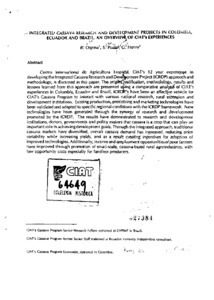Integrated cassava research and development projects in Colombia, Ecuador and Brazil : an overview of CIAT`s experiences
Centro Internacional de Agricultura Tropical, ClAT`s 12 year experience in developing the Integrated Cassava Research and Development Project (ICRDP) approach and methodology, is discussed in this paper. The origin, justification, methodology, results and lessons learned from this approach are presented using a comparative analysis of ClAT`s experiences in Colombia, Ecuador and Brazil. ICRDP`s have been an effective vehicle for ClAT`s Cassava Program to interact with various national research, rural extension and development institutions. Existing production, processing and marketing technologies have been validated and adapted to specific regional conditions with the ICRDP framework. New technologies have been generated through the synergy of research and development promoted by the ICRDP. The results have demonstrated to research and development institutions, donors, governments and policy makers that cassava is a crop that can play an important role in achieving development goals. Through the integrated approach, traditional cassava markets have diversified, overall cassava demand has increased, reducing price variability while increasing yields, and as a result creating incentives for adoption of improved technologies. Additionally, income and employment opportunities of poor farmers have improved through promotion of small-scale, cassava-based rural agroindustries, with low opportunity costs especially for landless producers

